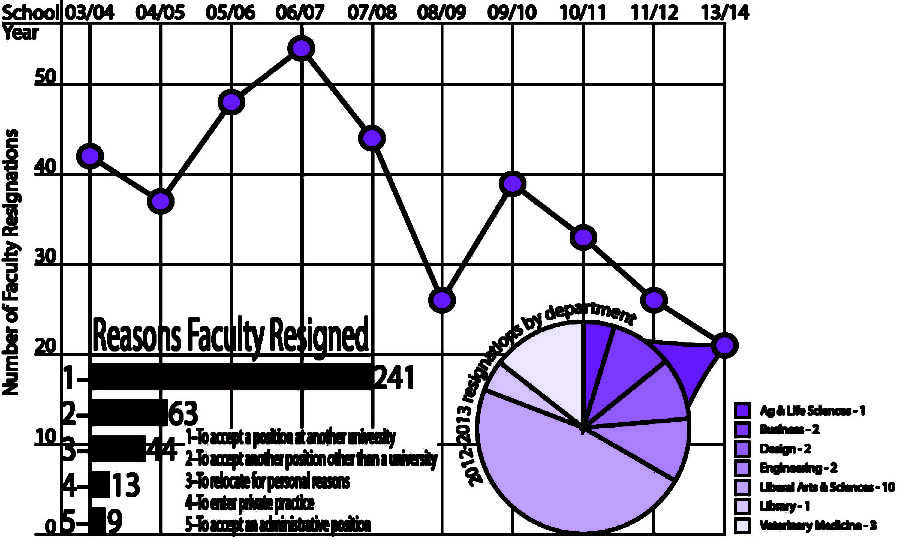Iowa State sees lowest number of faculty resignations in 10 years
Eric Michael Fields/Iowa State Daily
Resignations
February 11, 2014
The number of resigning ISU faculty members is declining.
A report given at the February Board of Regents meeting showed the lowest number of faculty resignations in 10 years.
In fiscal year 2013, Iowa State saw 21 faculty resignations out of 1,331 faculty according to the report.
This is a decrease from 26 resignations last year, and the lowest number of resignations in the last 10 years. The highest recent number of faculty resignations was in 2007 with 54.
Dawn Bratsch-Prince, associate provost at Iowa State, said over time, the ISU resignation rate has decreased. She said there are a number of different reasons as to why faculty resign, but each member has an individual story behind his or her choice to leave the institution.
Prince said the primary reasons for faculty leaving Iowa State are dissatisfaction with work load, dissatisfaction with the department chair or dissatisfaction with pay.
“It can be that all those are somehow connected,” Prince said. “The department chair is the leader of the department, so if someone is unhappy with their workload or pay, it’s not surprising that they would maybe articulate that as dissatisfaction with the department chair.”
Prince also said resignations are usually not “personal animosity” toward the department chair, but maybe dissatisfaction with the department chair’s use of the department’s resources.
The university conducts an exit survey so the university can better understand why faculty members are leaving and how the university can enhance programs to retain faculty, Prince said.
The report showed 13 of the 21 faculty who resigned responded to the online faculty exit survey and 54 percent said they were somewhat or very satisfied with workload, while 62 percent indicated a high or very high level of work-related stress.
Iowa State has programs and methods for incentives to keep faculty at the university, Prince said.
Recently the university developed a department chair professional development program.
“It’s a program to support our department chairs to provide them with information on how to foster a positive and supportive department culture for all faculty,” Prince said.
Prince said Iowa State also has numerous mentoring programs for new faculty. The programs explain Iowa State culture, expectations and a better understanding of being a professor at a major research university.
Salary may be another major reason faculty may choose to stay or leave the university. Prince said the economy and job market play a big role in faculty retention.
She said the economy right now is healthier and there is more competition among universities for good faculty.
“Sometimes our faculty are really pursued and recruited to consider positions at other universities,” Prince said.
Prince said the university might then offer the faculty member a counteroffer, whether it be slightly higher salary or another type of incentive.
Any faculty member can resign at any time, Prince said. She said most hand in their resignation so that the department has enough time to find a replacement in classes or other areas.
Veronica Dark, faculty senate president, said the senate gets a report on the number of faculty resignations, but that the senate doesn’t have a part in the process of a faculty member resigning. If there were a large number of resignations in a year, though, then the senate may start asking questions, Dark said.
Prince said all three regent universities, University of Iowa, Iowa State and University of Northern Iowa, discussed a commitment to work and life balance. All three universities have supporting programs that are family-friendly so that faculty can be successful and have a personal life, Prince said.
“Different programs that we have are to help faculty be successful, better teachers and better researchers,” Prince said. “When we do a search and hire a faculty member, I always tell this to faculty: we are making a commitment to them and do a rigorous search process and we want them to stay at the university.”







